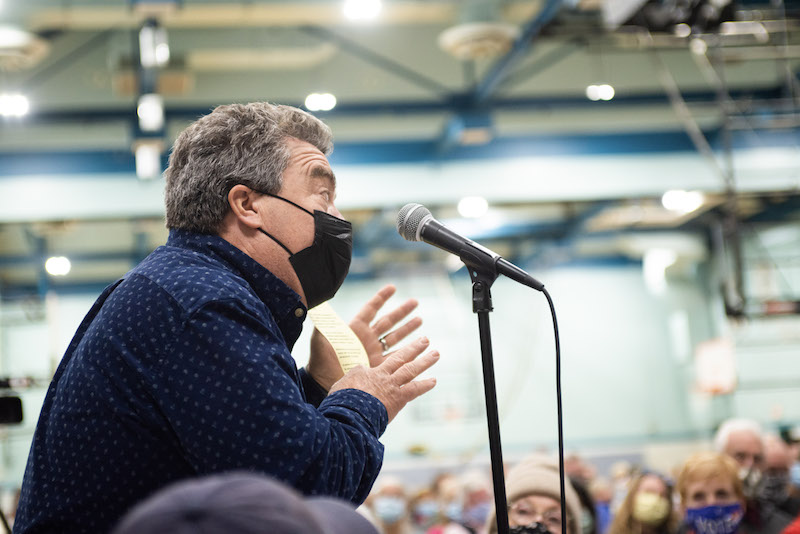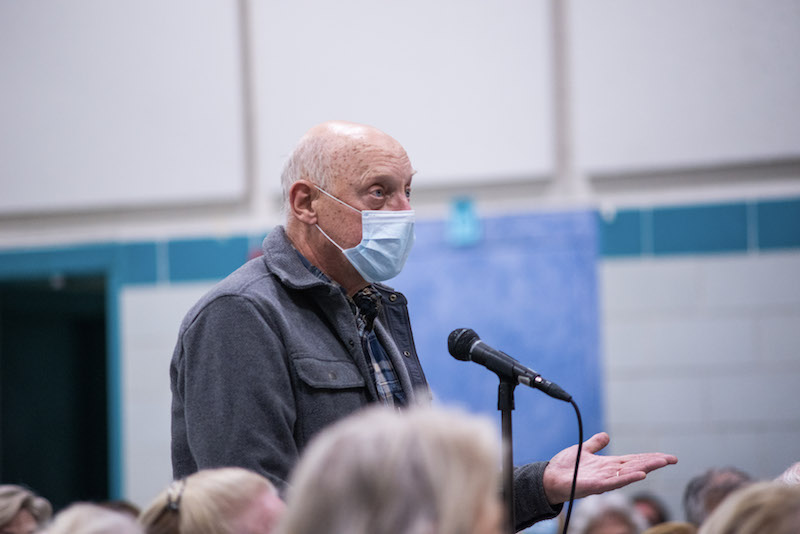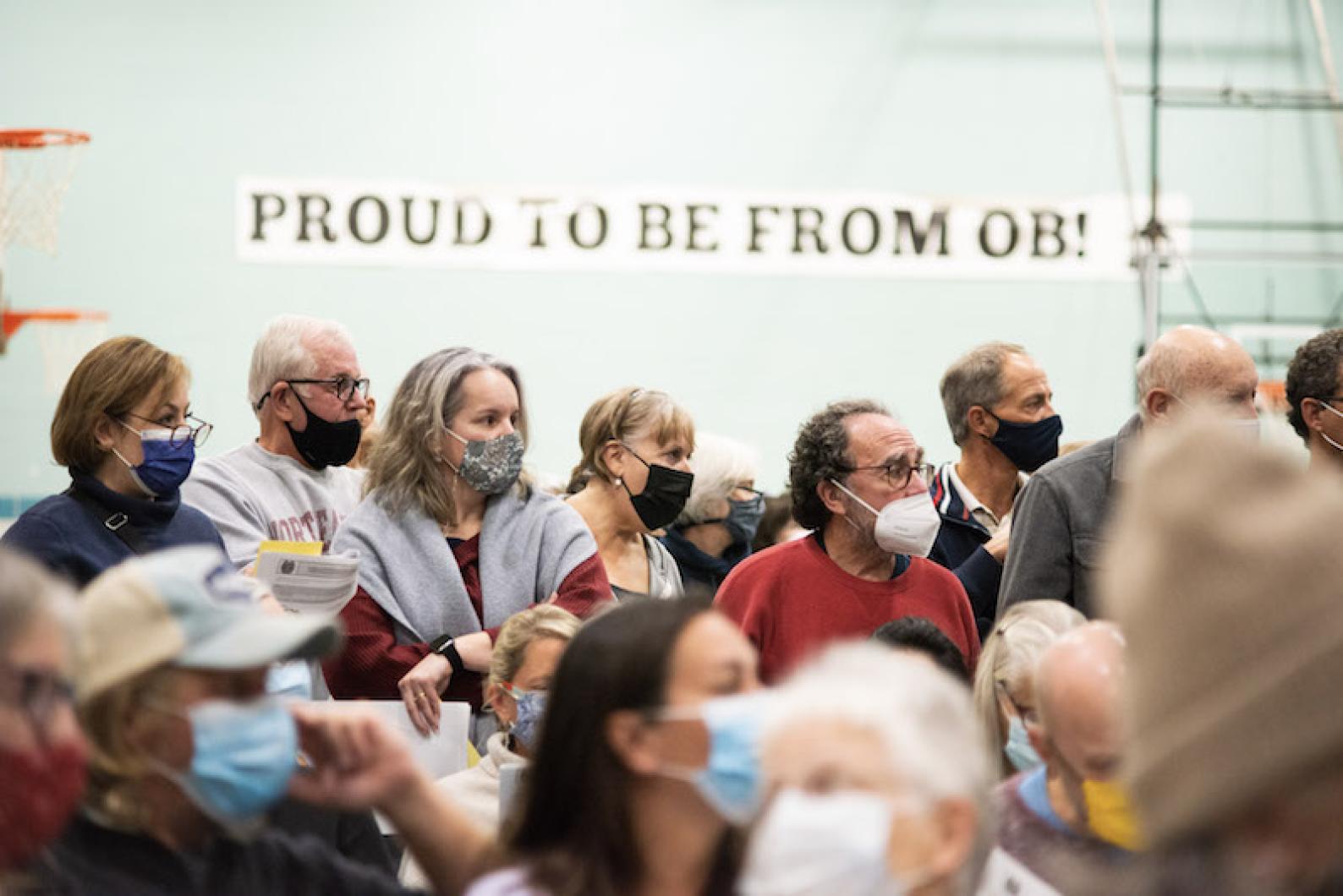A home rule petition to ban rental mopeds and a complicated land swap to create a large affordable housing project easily passed muster with Oak Bluffs voters at a special town meeting Tuesday night, but a controversial downtown streetscape plan took center stage at the packed meeting.

Three affordable housing-related articles will create around 60 year-round affordable rental units, transfer vacant town-owned land to the municipal housing trust, and swap a town-owned property with a similarly-sized land bank property.
A home rule petition that will ask state legislators to ban moped and scooter rentals in town passed with no discussion. A similar home rule petition was approved in 2018, but died on Beacon Hill.
Other issues, including the power structure of the fire and police departments, prompted discussion, but all were overshadowed by debate around the streetscape plan, which took up nearly half of the two-hour meeting, held in person at the Oak Bluffs School. Attendance was high, with more voters present than at the annual town meeting, moderator Jack Law 3rd said.
The streetscape project has been a flashpoint for controversy in town, most of it revolving around planned parking changes, which will change diagonal parking on Circuit avenue to parallel parking.
Two petitioned articles Tuesday night sought to compel the select board to place the parking orientation change and a Proposition 2 1/2 debt exclusion question for any borrowing beyond the already approved project cost on the annual town ballot next spring. At the outset it was determined that the articles were not legally binding, since ballot questions can only be added by citizen petition or a vote of the select board.
But discussion was allowed — and the arguments flew around issues including handicap accessibility, vehicle safety and governmental transparency.

In an impassioned speech, Bill Engler described the challenges he faces getting his wheelchair-bound daughter in and out of the car on Circuit avenue with its longstanding configuration of diagonal parking. He said a switch to parallel spots would immediately resolve the problem.
“When I’m in a parallel space . . . I can get it out,” Mr. Engler said, speaking about his daughter’s wheelchair.
Many others strongly opposed the change, which was approved in 2020 along with the larger streetscape plan.
“I honestly don’t think it’s a good idea because of safety issues,” said John Cummings, a former driver education instructor.
There was some attempt to find compromise. On two occasions speakers advocated for a trial period of parallel parking before the town begins any major renovations to Circuit avenue. But even that was met with contention.
“Go to Edgartown,” one voter blurted out from the crowd.
Others decried what they said was a lack of transparency, charging that townspeople had not been included in the decision making process.
“The bottom line is, you serve us,” said Rich Michelson, addressing the select board. “You need to give us the right in a vote,” he added, drawing sustained applause.
David Wilson contrasted the process around the streetscape project with the recent project to build a new town hall.
“I had no questions about the town hall project when I voted for it,” he said. “I do not feel that way about this project.”
But town officials and some voters rejected the notion that the public was fully not included in the streetscape planning process. Select board chairman Brian Packish said the plan has been in the works for years, and over a dozen meetings were held prior to the 2020 town meeting approval.
“It’s time to move on, and let the project go forward,” Dick Cohen said.
The moderator allowed a straw vote on the parking change alone, which saw a slim margin majority opposing it.
In a vote on the second Proposition 2 1/2 article, a slim majority of voters opposed it.
Because both articles were legally moot, the streetscape plan remains unchanged.
On a separate issue, fire chief Nelson Wirtz stood to oppose a select board article that would redistribute powers currently held by the fire chief. The article, which passed, will eventually change from the so-called strong chief statute to a weak chief statute. A strong chief has ultimate authority to hire, fire and set rules for the department, while under a weak chief statute those powers are left to the select board.
“I feel that it damages the chief’s ability to discipline,” said Chief Wirtz. “The select boards can change,” he added.
Town administrator Deborah Potter defended the planned move. “Absolute power corrupts absolutely,” she said.
The weak chief statute will not take effect until the end of Mr. Wirtz’s tenure with the department.
A similar article was approved for the police chief position, which chief Erik Blake said had little to no effect, since police staffing decisions are already handled by the select board.
“It really doesn’t matter on the police side,” he said.
The trio of affordable housing articles were ultimately approved, but when it came to article five, which concerned the Southern Tier housing project that aims to create around 60 year-round affordable rentals, Joe Micas took the floor to ask about the impact on Oak Bluffs School.
“Could be upwards of 200, 300 kids,” he said of the potential influx resulting from new residents. “Have we done studies on that?”
Affordable housing committee member Jim Bishop responded that most of the units are intended to be one-bedroom apartments, which would not likely be attractive to families with young children.
He cited the urgent need for decent housing.
“A lot of . . . people are living in town now in horrid conditions,” Mr. Bishop said.
Voters also approved an article declaring June 19, or Juneteenth, a town holiday and a number of housekeeping articles.









Comments (12)
Comments
Comment policy »